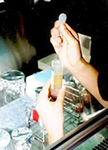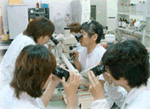 Laboratory Science is to educate and to research laboratory procedures which are useful for diagnostics and specimen sampling of the human body utilizing various technology. In order to obtain accurate information of the human body, the student must understand human bodies themselves. Laboratory Science is to educate and to research laboratory procedures which are useful for diagnostics and specimen sampling of the human body utilizing various technology. In order to obtain accurate information of the human body, the student must understand human bodies themselves.
Not only this, but in order to make the best use of the information obtained for diagnostic purposes, the student must know diseases and learn laboratory procedures as well. Also, physics and chemistry courses are offered concurrently, which are indispensable for students in order to be capable of developing new laboratory procedures.

At the same time, laboratory procedures of today are increasingly taking advantage of rapid technological advancement in molecular biology. One of the important challenges for students is to learn and master state-of-the-art technology.
We also offer courses pertaining to the latest analytical methodology, which are necessary to accurately monitor human body conditions. Faculty members, who are experts in each field, instruct a wide range of courses. Curriculums are rigorous, but we welcome students to live up to this challenge.
These two departments, Radiological Technology and Biomedical Engineering and Laboratory Science, share similar characteristics where one must understand the human body from the medical perspective and must be able to apply physical and engineering techniques at the same time. Because of this nature, these departments may jointly offer some courses. However, Radiological Technology and Biomedical Engineering focus more on mathematical and physical science techniques; in contrast, Laboratory Science emphasizes chemical techniques.
Nevertheless, at the
Osaka University School of Allied Health Sciences, these subjects are considered a part of one's academic discipline, and we educate students and research the subjects accordingly.
|

